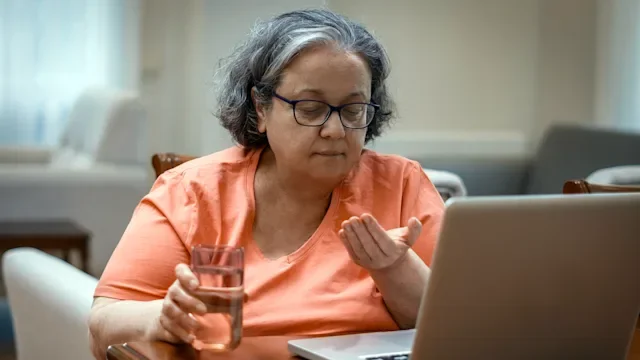Key takeaways:
Many people look for ways to prevent dementia as they get older. There are several things you can do at home to help keep memory loss at bay, including eating healthy and quitting smoking.
Brain games (cognitive training) have been an area of focus for researchers looking to help lower the risk of developing dementia. This includes traditional games — like crossword puzzles — and brain game apps on smartphones and tablets.
Current evidence doesn’t demonstrate that brain training may lower the risk of developing dementia. But cognitive training may still be beneficial for other reasons.
Getting older can bring multiple health concerns for many adults. But one health condition in particular sparks a major worry: dementia. It’s normal to have memory issues from time to time, like forgetting where you put your keys or phone. But the idea that you may forget the face or name of your loved ones can be frightening.
It’s a reality that, unfortunately, many people deal with. For instance, in 2014, the CDC estimated that dementia affected 5 million adults over age 65. They expect this number to rise over the next few decades.
So, you may wonder if there’s any way to prevent dementia. Recently, “brain games” — like puzzles — have been touted as a possible tool to prevent memory loss. But is this true?
Search and compare options
This article will explore whether brain games, including brain training apps on smartphones, can lower your risk of dementia.
What does dementia do to the brain?
Getting older doesn’t mean you’ll experience dementia. It isn’t a normal part of aging. For those who do experience dementia, it can impair your ability to think and process information.
This can lead to symptoms like:
Forgetting familiar people, places, or words
Having trouble speaking or writing
Having trouble completing normal daily activities
Having trouble with balance or coordination
Repeating questions or statements
Hallucinating or feeling paranoid
When a person has dementia, nerve cells (neurons) in the brain don’t function as they should. These neurons stop communicating with other neurons correctly. Eventually, it causes a large number of them to die.
Several health conditions can cause dementia. This includes strokes, Lewy body dementia, and, most commonly, Alzheimer's disease. Other causes are also possible.
What can I do to lower the risk of dementia?
Treating Alzheimer's-related dementia is difficult, with few medications available. So people often look for ways to prevent dementia-related conditions.
- NamendaMemantine
- AriceptDonepezil
- Memantine ERGeneric Namenda XR
There are recommendations from the World Health Organization (WHO) that may help lower the risk of developing dementia. It’s important to note that the evidence supporting these recommendations isn’t very strong. But the risks of trying them are low, and they may have benefits for other health conditions.
These recommendations include:
Eating a healthy diet, such as the Mediterranean diet
Exercising regularly
Stopping smoking
Drinking alcohol in moderation or avoiding alcohol altogether
Treating and managing other health conditions you may have, such as high blood pressure or diabetes
Practicing cognitive training
Cognitive training is focused on getting you to “exercise your brain” through different activities. These activities engage your critical thinking skills and may help maintain your cognitive skills over time.
You can do cognitive training in many different ways:
Creating art (like painting, drawing, coloring)
Taking classes
Gardening
Playing games that require strategic thinking (like chess or bridge)
Doing jigsaw puzzles
Some low-quality studies also suggest cognitive training may help improve overall cognition for people with mild to moderate dementia. But larger, higher-quality studies would be needed to confirm this.
Do brain games prevent dementia?
Since cognitive training may help people who have dementia, there’s some thought that it may also help prevent dementia. In fact, in 2018, people spent about $1.9 billion on smartphone and mobile device apps to help keep their brains active. Brain training apps seem to be the modern go-to method for cognitive training.
Unfortunately, there’s no significant evidence at this time to suggest that cognitive training can prevent dementia. However, the WHO does recommend cognitive training as the benefits may outweigh any risks.
Some studies suggest that for people with normal cognition, cognitive training may help improve or maintain thinking ability. But more research is needed to say whether it helps delay or prevent dementia. This is still a relatively new area of research.
Can brain games and training apps reverse dementia?
No, brain games and training apps haven’t been shown to reverse dementia. At this time, there’s an ongoing debate on whether brain training games can help prevent dementia. But no evidence exists that these games can reverse dementia once you have it. However, there may still be benefits, such as helping to improve your overall thinking and mood.
What types of games are good for dementia?
There’s been a lot of work evaluating which games may be good for dementia, such as chess, certain board games, and bingo. Currently, there hasn't been evidence to say whether or not certain activities help. However, what’s widely understood is that doing something may be better than doing nothing.
In terms of memory games for dementia on smartphones, none are FDA-approved or FDA-cleared for this purpose. These brain training apps have no clear clinical evidence for helping with or preventing dementia. Some companies actually got in trouble for making these claims in the past.
Looking forward, there’s a lot of interesting research being done on digital health technologies to help with or prevent dementia. This includes new mobile device apps, video games, and virtual reality tools. It’s possible that in the future, we may have better research and evidence about these digital health tools than we do now. Additional new and innovative brain health technologies may pop up in the future, too.
How does stimulating your brain help improve cognitive function?
Like exercising your body, exercising your brain may help keep it strong and able to think critically. One possible explanation for this is called cognitive reserve. Some researchers suggest that if you exercise your brain, you build up a larger reserve of brain function. So if you begin to experience a loss of cognitive function, it might take longer to have a more severe effect when you have a larger reserve.
However, this is just a theory. It hasn’t been proven by clinical studies.
How often do you need to exercise the brain in order to notice the benefits?
There’s no specific amount or frequency of cognitive training that you need to do. Remember, all that we know is that doing some amount of brain training is likely better than doing nothing at all.
Some people call this the “use it or lose it” theory. In other words, the more you use your brain, the better. In terms of research, some data has shown that doing cognitive activities twice a week may be helpful, but we don't know if doing more is better.
Finding something that you like to do and find joy in is important. Building a habit that helps you keep your brain active will be helpful. This can range from doing traditional brain games with a pen and paper to playing brain training apps on your smartphone or tablet.
The bottom line
Cognitive or brain training activities may be helpful to improve or maintain your cognitive abilities. Whether this could prevent or lower your risk of dementia isn’t known. However, there may be benefits to these types of games and brain training apps. And the risk of playing these brain games is low.
So you may still find it beneficial to give cognitive training a try. Hopefully, future research will help determine what strategies work best for different people.

Why trust our experts?



References
Alzheimer’s Association. (n.d.). 10 ways to love your brain.
Alzheimer’s Association. (2017). Brain fitness.
Alzheimer’s Society. (n.d.). Brain training and dementia.
Bahar-Fuchs, A., et al. (2019). Cognitive training for people with mild to moderate dementia. Cochrane Database of Systematic Reviews.
Butler, M., et al. (2018). Does cognitive training prevent cognitive decline? A systematic review. Annals of Internal Medicine.
Centers for Disease Control and Prevention. (2019). What is dementia?
Dartigues, J. F., et al. (2013). Playing board games, cognitive decline and dementia: A French population-based cohort study. BMJ Open.
Federal Trade Commission. (2016). Lumosity to pay $2 million to settle FTC deceptive advertising charges for its “brain training” program.
Kletzel, S. L., et al. (2021). Effectiveness of brain gaming in older adults with cognitive impairments: A systematic review and meta-analysis. Journal of the American Medical Directors Association.
Lillo-Crespo, M., et al. (2019). Chess practice as a protective factor in dementia. International Journal of Environmental Research and Public Health.
Litwin, H., et al. (2017). Cognitively stimulating leisure activity and subsequent cognitive function: A SHARE-based analysis. The Gerontologist.
MedlinePlus. (2019). Lewy body dementia.
National Institute on Aging. (2021). What is dementia? Symptoms, types, and diagnosis.
O’Shea, D. M., et al. (2017). Doctor, should I use computer games to prevent dementia? Clinical Gerontologist.
Savulich, G., et al. (2017). Cognitive training using a novel memory game on an iPad in patients with amnestic mild cognitive impairment (aMCI). International Journal of Neuropsychopharmacology.
Simons, D. J., et al. (2016). Do "brain-training" programs work? Psychological Science in the Public Interest.
Sobel, B. P. (2001). Bingo vs. physical intervention in stimulating short-term cognition in Alzheimer's disease patients. American Journal of Alzheimer's Disease and Other Dementias.
Staff, R. T., et al. (2018). Intellectual engagement and cognitive ability in later life (the “use it or lose it” conjecture): Longitudinal, prospective study. BMJ.
Stern, Y. (2012). Cognitive reserve in ageing and Alzheimer's disease. The Lancet Neurology.
Toy, S. (2019). People spent $1.9 billion last year on apps to keep their brains sharp as they age — Here’s what actually works. Market Watch.
Wais, P. E., et al. (2021). Virtual reality video game improves high-fidelity memory in older adults. Scientific Reports.
World Health Organization. (2019). Risk reduction of cognitive decline and dementia: WHO guidelines.














